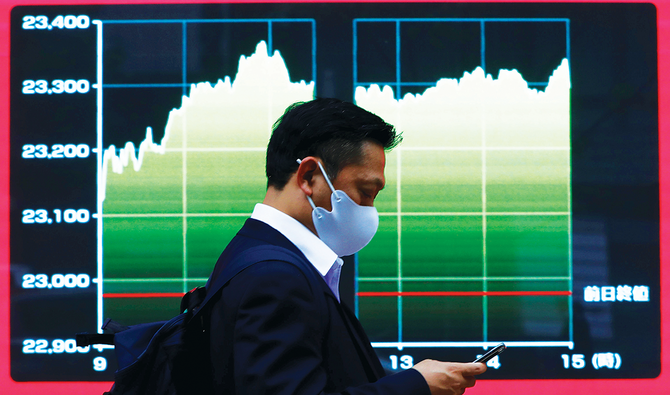
- ARAB NEWS
- 01 Jul 2025

MILAN: Shares on Monday recovered globally from one-month lows as strengthening factory data in China and Europe offset news of new virus lockdowns, while investors prepared for more volatility arising from the US presidential election.
The MSCI world equity index, which tracks shares in 49 countries, was up 0.5 percent, following a strong performance in Asia after data showed Chinese factory activity expanded at its fastest pace in a decade.
A boom in eurozone manufacturing in October helped Europe leave behind a cautious start after the UK became the latest country in the region to announce a fresh lockdown to fight a second wave of COVID-19 infections.
Italy was also set to approve new restrictions in the coming days but said it was holding back from reintroducing a nationwide lockdown after such moves in France and Germany last week caused a broad risk-off move across markets.
The pan-European FTSEurofirst 300 benchmark, which reached a five-month low last week, was last at its session high, up 1.3 percent, also supported by hopes the lockdowns wouldn’t last as long as the previous round.
“Europe is facing up to a harsh winter ahead,” Deutsche Bank strategist Jim Reid said in a note. “The question to be asked to all the European countries is can they come out of these measures in some form toward the end of November/early December as is hoped or will they be extended further.”
The focus was increasingly shifting toward the US election on Tuesday, although investors prepared for the chance that it could take a few days before the result becomes clear.
“Given the likelihood that the outcome of the presidential election will be unclear on Wednesday, and possibly for much longer, volatility could easily pick up and it might become a severe roller-coaster ride,” UniCredit strategists said.
Analysts are concerned that an uncertain outcome could cloud the prospects for fiscal stimulus in the world’s No. 1 economy at a time when support is much needed. Also crucial for the size of a possible stimulus will be which party wins the Senate.
The VIX volatility index, which rose to its highest in four months last week, eased half a point to 37.5.
US stock index futures rose around 1 percent, indicating a clear recovery on Wall Street at the open following its steepest weekly loss since March.
Despite the potential uncertainty, JP Morgan Cazenove equity strategists led by Mislav Matejka sounded upbeat.
“Any clear result is likely to be seen as a positive, with investors then able to look forward to a fiscal stimulus down the line,” they said.
“Stalemate/contested elections would lead to further risk-off trading, but we believe that if such a scenario arises, one should be using the weakness as an opportunity to add exposure on a 3-6-month horizon,” they added.
Meanwhile, the fresh lockdowns in Europe and parts of the United States have raised concerns over the outlook for fuel consumption. Brent crude prices fell to a low of $35.74 per barrel, a level not seen since late May. They later recovered to trade down 1.6 percent at $37.33. US crude went as low as $33.64.
Global coronavirus cases surged last week with Europe crossing the bleak milestone of 10 million total infections. The UK is grappling with more than 20,000 new cases a day while a record surge in US cases is killing up to 1,000 people a day.
In currencies, the UK pound fell 0.1 percent to $1.293 after hitting its lowest in almost four weeks on news of the national lockdown. The euro was broadly unchanged at $1.165.
The risk-sensitive Australian dollar went below 70 US cents for the first time since July before turning higher, while the Japanese yen was flat at 104.62 per dollar.
That left the index that measures the dollar against a basket of other currencies down 0.1 percent at 93.98.